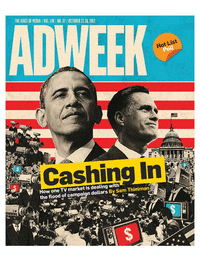Jimmy Wales: Make Your Brands Authentic
NEW YORK Wikipedia co-founder Jimmy Wales is a big believer in authenticity, so much so that he mentioned it over a dozen times during an on-stage interview as part of Advertising Week. In the view of Wales, brands need to get beyond blasting messages at people and start providing tools for their supporters to convey real views of products.
CLICK HERE FOR COMPLETE COVERAGE OF ADVERTISING WEEK 2008
"You have to be sincere about allowing for community control," Wales said in an interview with Liz Ross, Tribal DDB's president of the Americas and global CMO. "The best way to approach it is to create a product that doesn't suck," he added.
Wikipedia has been a runaway success. It attracted almost 87 million visitors in August, according to comScore Media Metrix, ranking it as the No. 8 global Internet brand.
In 2004, Wales started Wikia to apply the lessons of Wikipedia to a for-profit business. Wikia lets users create fan sites about nearly any topic. Wales touted the site built by fans for the DreamWorks movie Transformers. It now has 6,000 pages of content and has generated the equivalent of 20 million free impressions for the toy and movie franchise.
"They're actually going out and selling the brand," he said. "It's very different from the top-down broadcast-style marketing."
Prior to his appearance, Wales sat down with Adweek to discuss the secret of Wikipedia's success, the threat of Google's power and how advertising needs to change.
What is responsible for Wikipedia's success?
Everyone always knew the Web is ... an interactive participatory medium. But it took a long time for the medium to mature and for people to figure out social models that work in terms of people love to talk, discuss and debate. The question becomes, how can people come together to build something rather than a message board where people endlessly argue and debate? People love building things with their friends and people they share an interest with. The success is driven by the fact that the resulting product is something people like to read. It's a cycle. As it began to get popular, it drew more authors and more content, which drew more readers, and so on. It's a shift from top-down media to bottom-up media.
How much do you owe the participation Wikipedia has attracted to its non-commercial status?
I think it's important in certain ways, but not in the ways most people think. Most people who work on Wikipedia do it because they enjoy it. It's not something you do because it's a charity. I believe people will do things from a charitable impulse only to a certain point. If people volunteer, they have to enjoy the work itself. If it's enjoyable and inherently rewarding, people will continue to do it. Everybody who is participating has to have a reason to participate. Those reasons can be quite diverse. [Wikipedia] being a charity and a social utility is part of it, but it's not everything.
Why didn't you have advertising on Wikipedia?
In the early days, we wouldn't have been able to support the site through ad revenue. It would have been so tiny it wouldn't be worth it. We were born in the dot-com-crash era. We didn't have that as a viable option. It was really a hobby, a group of people who had come together to write an encyclopedia. We thought of it as a community project. People didn't want to have advertising on it and donations worked fine.















